Content
Kombucha is a living organism, a symbiosis of vinegar bacteria and yeast. It is a gelatinous, jellyfish-like mass that floats in a nutrient solution of tea leaves and sugar, and in a few days processes it into a delicious, healthy kombucha drink. Midges in kombucha are unpleasant, but natural. Insects are attracted by the odor released during fermentation.
Why midges, larvae, worms start in kombucha
To obtain kombucha, jellyfish are immersed in a mild, sweetened brew. Midges, if you do not cover the container with the infusion, will surely appear, especially in the summer. The question arises: is it possible to use such a drink and what to do with living creatures.
If a mosquito or an ant accidentally gets into the jar, the insects are simply removed. Particularly squeamish people can pour out the drink, rinse the container and jellyfish (the scientific name for kombucha). But this is the least of the possible problems - fermentation and sweets are not so attractive for mosquitoes, and an ant can get into the jar only by accident or with complete unsanitary conditions. In any case, they will not do anything bad with the infusion.
Whose larvae appear in kombucha
The worms on the kombucha did not start by themselves. They were laid by the fruit flies of Drosophila, attracted by the smell of fermentation. This is an extensive genus, only the described species number 1500 (23 are well studied). Scientists suggest that there are actually several times more of them.
Many species of fruit flies are synanthropic organisms, that is, they are attached to human habitation, feed on waste and products that begin to decompose. And the fermentation process is biological decay under the influence of microorganisms. Exactly what fruit flies need to function and lay eggs.
How worms appear on kombucha
If the jar of jellyfish is poorly covered, fruit flies can easily penetrate there. They do not need a large hole - the female's body reaches a length of 2 mm, while the male is even smaller. There, insects feed on a sweet solution and lay eggs in the body of the kombucha. It is very difficult to notice them with the naked eye, since the size does not exceed 0.5 mm.
Embryos develop for a day, then larvae appear on the kombucha, beginning to actively eat the jellyfish. They eat foods that have at least a trace of vinegar fermentation. Kombucha itself produces it.
It is at this moment that Drosophila larvae can be seen for the first time on the surface of the substance. Then they gnaw passages in the kombucha, continuing to feed, and hide inside.
The cycle lasts 5 days. By the beginning of pupation, the larvae stop eating the medusomycete, crawl out to the surface and begin to move actively. This is how white worms appear on kombucha.
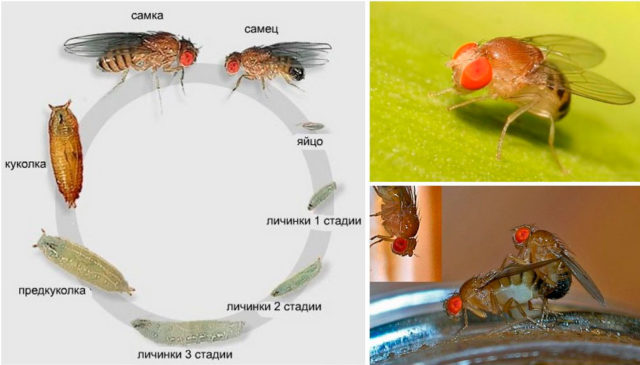
Full development cycle of Drosophila - adults, eggs, larvae, pupae
The pupa develops within 3 days. Right on the kombucha, she sheds her shell, and after 10 hours she is ready for a new fertilization.Each fruit fly in the summer lives for 10-20 days, constantly mates and lays eggs.
What to do if worms or midges are in the Kombucha
If worms are bred on the kombucha, you can only throw it away. Some try to save the medusomycetes by tearing off and discarding the top plates. But this can only be done on an old mushroom. And there is no guarantee that the larvae that have climbed there have not lurked in the remaining layers.
Even a few pieces in 9-10 days will give a new generation, numerous and prolific. Medusomycetes will still have to be thrown away. It is better to ask friends for a healthy plate or grow it yourself from scratch.
Is it possible to drink a drink if there are midges or larvae in the kombucha
The fruit midges themselves are safe for a person, if he even accidentally eats a few pieces along with unwashed fruits that have been offended by them. But the larvae are another matter. They can cause intestinal myiasis, characterized by:
- diarrhea;
- vomiting;
- pain in the stomach and intestines.
Ingestion of Drosophila larvae with food and drink often ends with enteritis - a very unpleasant disease of the small intestine. Such "happiness" is not necessary for a healthy person, and for those who take medusomycete infusion for treatment, it can be a real blow.
What to do to prevent midges from growing in kombucha
If worms start in the kombucha, it means that fruit flies have entered the container. To protect against insects, simply covering the jar of preparing kombucha with gauze is not enough. It is the vinegar-yeast smell that attracts mosquitoes. The aroma of the jellyfish is much stronger than that of fruits or kitchen waste that have begun to rot. And for fruit flies it is even more pleasant.
The neck of the can should be covered with gauze or other thin, air-permeable cloth folded several times. It must be intact and not dilapidated. Flies will try to get inside, looking for the slightest gap. Secure with an elastic band or rope.
How to prevent the appearance of fruit flies, you can advise:
- do not keep ripe fruits in the same room with kombucha, let alone those that have begun to rot;
- take out the trash bin on time;
- use thick gauze or other fabric folded several times;
- hang up sticky tapes for flies.
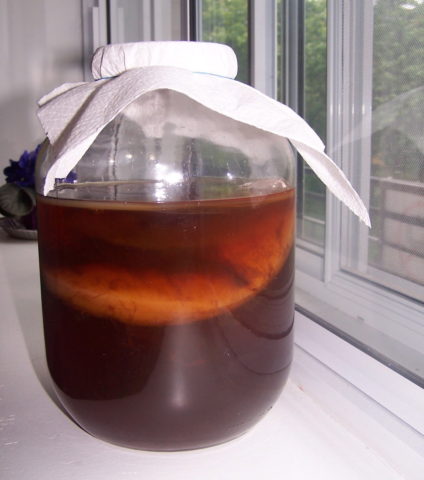
To prevent larvae from growing in the kombucha, the jar must be tightly tied with a strong, air-permeable cloth.
What is not recommended is making homemade midge traps. Drosophila will still crawl into the jellyfish, it is much more attractive to them than honey, beer or pieces of fruit.
How to properly care for kombucha can be found in the video:
Conclusion
Midges in kombucha don't just start. They are attracted by the smell of fermentation, and the way is opened by a loosely closed neck. It is very simple to avoid this - you need to use thick gauze and an elastic band. But if the fruit fly has gotten inside, the kombucha should be poured out, and the jellyfish should be thrown away.
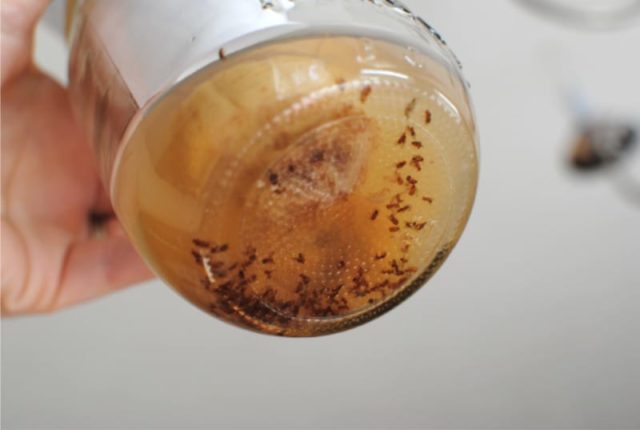

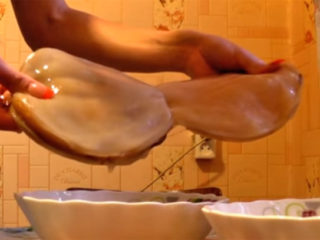
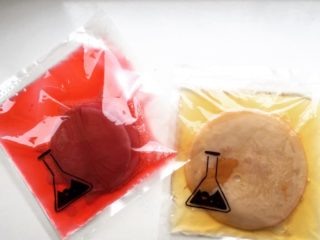
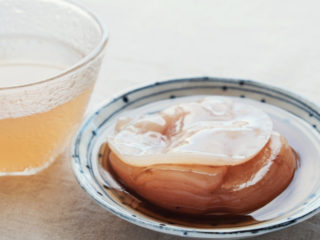
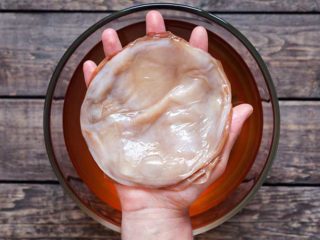
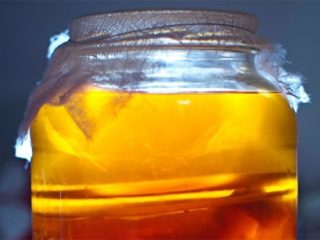



When the midges have already laid their eggs on the kombucha, can the top layer be removed and thrown away and left with the rest?